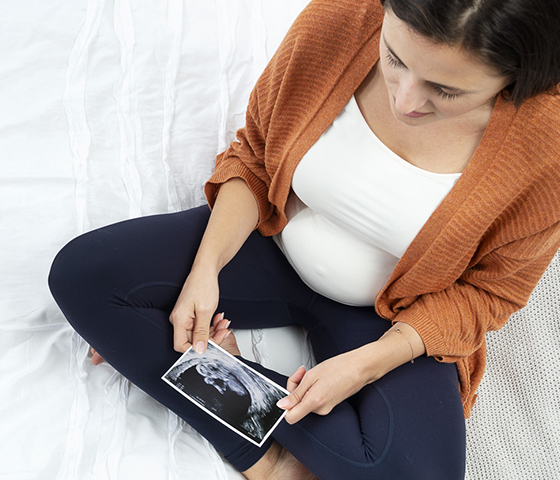すべての人にとってNIPTが必要な時
セルフリーDNA(cfDNA)スクリーニングとも呼ばれる非侵襲的出生前検査(NIPT)は、出生前異数性スクリーニング検査の一種です。母体からの採血が容易なため、NIPTは早ければ10週目に胎児の染色体異数性の有無を非侵襲的にスクリーニングできます。ACOGとSMFMは、年齢またはリスクに関係なく、NIPTをすべての妊婦のスクリーニングの選択肢として認めています。2
非侵襲的
NIPTは、採血と同じくらい安全で簡単です。2

正確
早ければ10週目で、21トリソミー、18トリソミー、13トリソミーに対し99.9%以上の感度と特異性。1
早期
NIPTは、妊娠10週目から正期産まで実施できます。2

スクリーニングを拡大し、洞察を拡大する。
NIPTを拡大することで、患者のリスクを抑えながら、23対の染色体すべての包括的な見解を得ることができます。このパンフレットをダウンロードして、21番染色体、18番染色体、13番染色体以外の拡大検査オプションについてご覧ください。2、3
ダウンロード
侵襲的検査が少ないということは、母体や胎児へのリスクが少ないことを意味します
NIPTの採用と導入により、従来の出生前血清スクリーニングよりも複数の利点をもたらし、妊娠(周産期)管理に情報を提供します。4~8
妊娠1,000件中、21トリソミー、18トリソミー、13トリソミーに対する不必要な侵襲的処置の件数
NIPT
偽陽性率:0.13%7
~1
不要な侵襲的処置
vs
従来のスクリーニング
偽陽性率:4%9
40
不要な侵襲的処置
図は、各検査で偽陽性結果が得られ、確定診断検査を必要とする妊婦1,000人の仮想母集団について導かれたものです。
同僚が、NIPTをどのように診療に取り入れているかを聞く
製品説明
VeriSeq NIPT Solution v2は、妊娠10週以上を経過した妊娠中の女性の母体全血検体からゲノムワイドな胎児遺伝子異常を検出するためのスクリーン検査として使用することを目的とした臨床検査テストです。VeriSeq NIPT Solution v2では、全ゲノムシーケンスにより、すべての常染色体の部分的重複と欠失、そしてすべての染色体の異数性状態を検出します。このテストには、性染色体異数性(SCA)のレポート作成をリクエストするオプションもあります。本製品は、単独で周産期管理の意思決定や診断には使用することはできません。母体血液からのセルフリーDNA分析に基づく非侵襲的出生前検査(NIPT)は、スクリーニング検査であり、診断ではありません。検査結果を診断の唯一の根拠として使用しないでください。妊娠に関する取り返しのつかない決断を下す前に、さらなる確認検査が必要です。
精度に関するクレームは、特にVeriSeq NIPT Solution v2を対象としています。
参考文献
- 社内データ、イルミナ 2019年
- Rose NC, Kaimal AJ, Dugoff, L, et al. ACOG Practice Bulletin 226: Screening for fetal chromosomal abnormalities. Obstet Gynecol. 2020;136(4):e48-e69.
- Pertile MD, Halks-Miller M, Flowers N, et al. Rare autosomal trisomies, revealed by maternal plasma DNA sequencing, suggest increased risk of feto-placental disease. Sci Transl Med. 2017;9(405):1-11.
- Platt LD, Janicki MB, Prosen T, et al. Impact of noninvasive prenatal testing in regionally dispersed medical centers in the United States. Am J Obstet Gynecol. 2014;211(4):368.e1-368.e7.
- Larion S, Warsof SL, Romary L, Mlynarczyk M, Peleg D, Abuhamad AZ. Association of combined first-trimester screen and noninvasive prenatal testing on diagnostic procedures. Obstet Gynecol. 2014;123(6):1303-1310.
- Bianchi DW, Parker RL, Wentworth J, et al; for CARE Study Group. DNA sequencing versus standard prenatal aneuploidy screening. N Engl J Med. 2014;370(9):799-808.
- Gil MM, Accurti V, Santacruz B, Plana MN, Nicolaides KH. Analysis of cell-free DNA in maternal blood in screening for aneuploidies: updated meta-analysis. Ultrasound Obstet Gynecol. 2017;50:302-314.
- Chudova DI, Sehnert AJ, Bianchi DW. Copy-number variation and false positive prenatal screening results. N Engl J Med. 2016;375(1):97-98.
- Santorum M, Wright D, Syngelaki A, Karagioti N, Nicolaides KH. Accuracy of first-trimester combined test in screening for trisomies 21, 18 and 13. Ultrasound Obstet Gynecol. 2017;49(6):714-720.